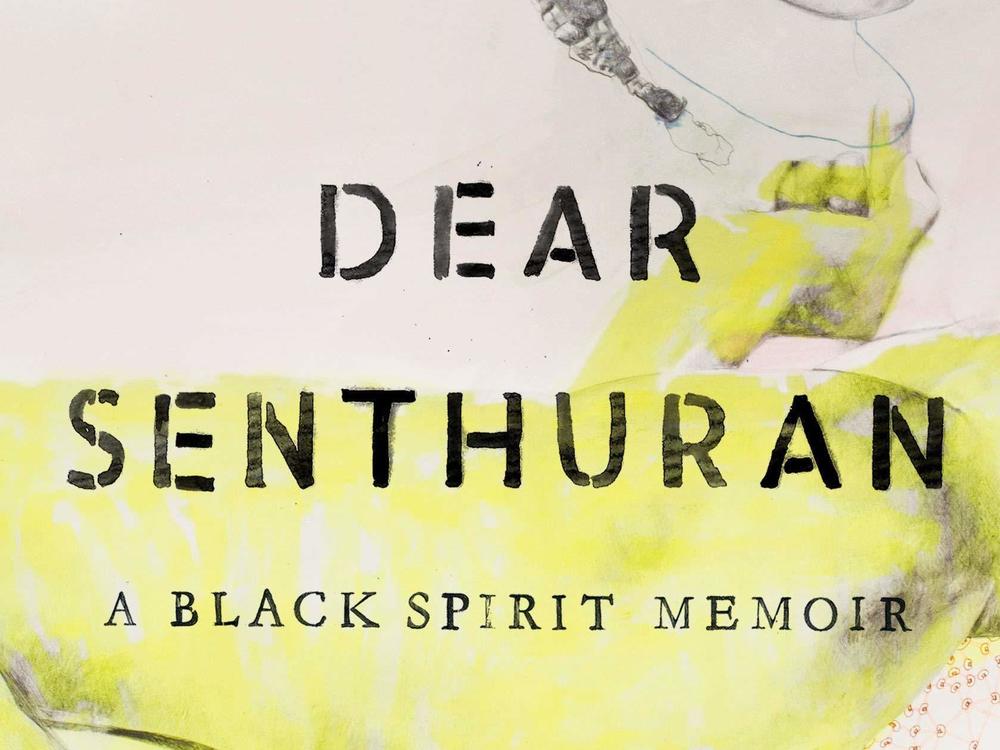Section Branding
Header Content
Letters Reveal Author's Strength In A World Of Destructive Noise
Primary Content
"People can do spectacular things if you forget to tell them it's impossible," Akwaeke Emezi writes several chapters into their new book Dear Senthuran: A Black Spirit Memoir.
Structured as letters to various people — some friends, some lovers, some public figures like Toni Morrison whom Emezi has never met in person — each letter reveals an aspect of Emezi's life that has shaped them into the being they have become.
What is revealed in these letters is both the immense strength Emezi has nurtured in order to sustain a belief in who they are despite the destructive noise of the world, as well as Emezi's own brave and poignant vulnerability in charting this journey. Dear Senthuran becomes Emezi's story of transcendence over the violence that has marked their lived experience, beginning with the physical and sexual violence they experienced growing up in near poverty in Aba, Nigeria, where "cockroach eggs gelled into the egg grooves of the fridge door." Childhood was the "house where bad things first happened, the house our mother left us in, the house of our father's temper and our brother's cruelty" and where an "old neighbor had groped me when I was twelve."
There is also the general backdrop of cultural violence in Nigeria that was a regular part of the young Emezi's life: whether it be the burnings of mosques and massacres of Muslims and Northerners, the violence of local vigilante group the Bakassi boys, or their own "state governor who had allowed the killings — just like he allowed the riots in 2000 after the massacre of Igbos in Kaduna, after they stacked our dead in lorries and sent them back to us."
More specifically, the trauma of violence written on the body becomes a potent theme in the text. There is the pick-up truck that shatters Emezi's sister's leg when a child: "her skin had opened differently then, more intricately, chopped up by white bone screaming out of the pulpy red." There is the deep burn that savages Emezi's leg when young as well: "by the time I went to school the next day, my burn had bubbled up and split. I packed it with powder and two types of iodine, til it was ugly and crusted in purples and reds." Or the chronic pain Emezi begins to suffer from later on in life. From this, Emezi writes, "I learned that humans are meat."
There is also the psychological violence of not being heard. After relocating to the United States for school and work, Emezi endeavors to obtain their first breast reduction surgery and then a hysterectomy, but they are met with a transphobic culture that questions their sanity and agency. Indeed, Emezi's first surgery requires them to produce a letter from a therapist: "If I'd asked for an augmentation that would have been fine, but wanting smaller breasts in the absence of back pain was considered ridiculous enough to require a therapist's approval," Emezi details.
Over and over, Emezi writes, "the doctors received me with resistance and with thin contempt. 'What if you change your mind?' they asked me."
This dual resistance and patronization of the medical establishment is the intersection of both transphobia and lack of belief in Black people's articulation of their health concerns when seeking medical care. A 2020 poll by the Kaiser Family Foundation and The Undefeated found that "one in five Black adults say they were treated unfairly because of their race in the past year when getting health care for themselves or a family member," while a 2016 study from the peer-reviewed journal Proceedings of the National Academy of Sciences of the United States of America showed that "Black Americans are systematically undertreated for pain relative to white Americans."
The experience of this is, in turn, draining upon one's mental health — so much so that when Emezi finally meets an understanding doctor with experience with trans patients they are numb from the shock: "I'd been terrified he'd been going to say something transphobic, that I'd have to deal with the violence of that tearing through my skin, a bullet I hadn't scheduled when I had shown up there that afternoon."
For Emezi, transitioning was difficult not just because of the medical establishment in the United States, but because their own culture believed it went against Igbo cultural norms. "It was too easy to tune in to my community and hear the voices heavy with disgust, saying that what I had done was disfiguring, that God had made me one way for a reason and I had no right to do otherwise, that I was mutilating myself," Emezi writes.
What sustains Emezi throughout these traumatic experiences is twofold: firstly, it is their belief in their own power to manifest spells of their own making into reality: "I believed in the spell with everything I had—and maybe that is the generator for it all—that utter belief." This knowing sustains Emezi through the violence of predatory men who target the young and vulnerable, the toxic culture of their primarily white MFA program, and the preconceptions of what an African woman writer was supposed to sound like—the box Emezi was placed in even though they didn't identify as a woman.
The second was Emezi's understanding that they were not only trans, they were actually ogbanje, "an Igbo spirit that's been born to a human mother, a kind of trickster that dies unexpectedly only to return in the next child and do it all over again." Although similar, the relationship between being trans and ogbanje is distinct and separate. "In flesh terms being trans means being any gender different from the one assigned to you at birth," Emezi explains. "Whether ogbanje are a gender themselves or a without gender didn't really matter, it still counts as a distinct category, so I didn't consider my transition located within human parameters at all." And then, Emezi realizes, they are "not just an ogbanje, but also an embodied god."
Understanding identity in this way allows Emezi a powerful framework for navigating their experience in the world. At times, the union of these understandings creates a powerful force for Emezi's life. Consider the moment Emezi first hears Toni Morrison say these words in her Nobel Prize-winning speech: "I stood at the border, stood at the edge, and claimed it as central and let the rest of the world move over to where I was." In Morrison's words, Emezi hears a spell that they adopt as central to their life and work, giving Emezi the strength to make interviewers "acknowledge my multiplicity of self on air, made the press use plural pronouns, and center Igbo ontology as a valid reality only made unreal by colonialism." This spell, too, allows Emezi to write and publish Freshwater, their first book, and then two more books in quick succession: the young adult novel Pet and their second adult novel The Death of Vivek Oji.
And yet, despite all this, Emezi still experiences deep depression combined with suicidal thoughts—most notably with the publication of their first book Freshwater and at the end of a long-term relationship with a lover named only as the magician. "I feel Death pressing closer, tighter, leaning against my neck and rustling in my ear." Drawing upon the support of friends, therapy, and community Emezi is able to heal by understanding the impermanence of all relationships as well as the permanence of their own strength.
Written in imagistic language that is both poetic and crystalline, Dear Senthuran is an honest and lyrical accounting of a boundless mind exploring the wide expanse of creativity and experience. Authentic and vulnerable, the writing winds through the depths of wrenching wounds, but also explores the beauty in not pretending to be less that one truly is.
While some may call this arrogance, for Emezi, this articulation is necessary: "We all know the thing of how Black artists are meant to be grateful and humble," Emezi writes, admitting that at times they "still play small, out of habit and comfort." We also know that, when strong and confident, those not gendered as men are seen in a negative light. But to pretend to be weak often means that one then takes on that mask of smallness as a reality; Emezi has learned that to survive the everyday violence of life, they must be strong. And after a lifetime of being pressured to not live their truth, they have learned the necessity of trusting themselves—without self-deprecation or apology.
Hope Wabuke is a poet, writer and assistant professor at the University of Nebraska-Lincoln.
Copyright 2021 NPR. To see more, visit https://www.npr.org.
Bottom Content




